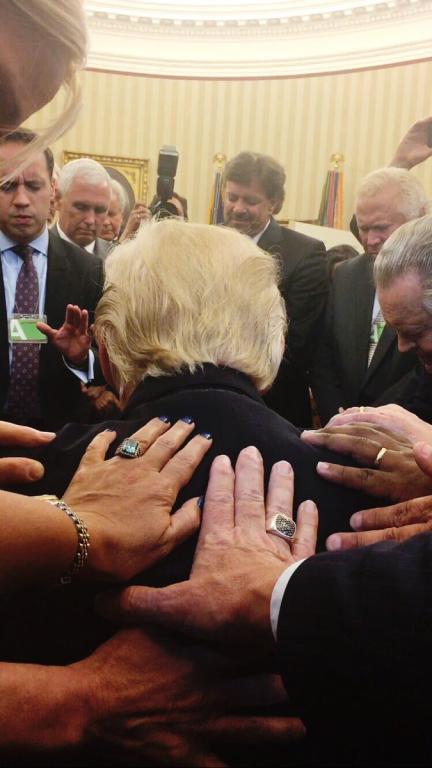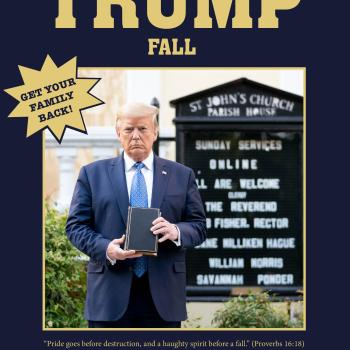 I think this is a tough question to answer. Donald Trump formed his Religious Advisor Council during his presidential campaign last year. He announced its long list of members in June, 2017. It included many Evangelical leaders. Evangelicals then contributed big time to electing Trump as president. Pew Research Center afterwards said that among all Evangelicals who voted in last year’s presidential election, 81% of them were Evangelicals. One wonders how many of these people voted for Trump because his Religious Advisor Council included so many respected Evangelical leaders. Trump’s motive for forming this group could have been to sincerely seek their advice, or to use their influence to get elected, or a combination of these two motives. I suspect it was the latter. The question is how much he may have weighed in on one motive over the other.
I think this is a tough question to answer. Donald Trump formed his Religious Advisor Council during his presidential campaign last year. He announced its long list of members in June, 2017. It included many Evangelical leaders. Evangelicals then contributed big time to electing Trump as president. Pew Research Center afterwards said that among all Evangelicals who voted in last year’s presidential election, 81% of them were Evangelicals. One wonders how many of these people voted for Trump because his Religious Advisor Council included so many respected Evangelical leaders. Trump’s motive for forming this group could have been to sincerely seek their advice, or to use their influence to get elected, or a combination of these two motives. I suspect it was the latter. The question is how much he may have weighed in on one motive over the other.
President Trump’s Religious Advisory Council still exists. It includes such illustrious and therefore influential Evangelical names as James Dobson, Jerry Falwell Jr., Franklin Graham, Richard Land, Ralph Reed, Johnnie Moore, and televangelists Paul White, Kenneth and Gloria Copeland, James Robison, David Jeremiah, and Jentezen Franklin to name a few.
After the Charlottesville, Virginia, racial demonstration occurred weeks ago, in which President Trump afterwards made unsettling remarks that seemed racist, A.R Bernard, a senior pastor and chief executive of the Christian Cultural Center in Brooklyn, New York, and a member of President Trump’s Religious Advisory Council, withdrew his membership and issued a statement that included these words, “there was a deepening conflict in values between myself and the [President’s] administration. I quietly stepped away from my involvement with the board several months ago and submitted my formal letter of resignation as of Tues Aug 15, 2017.”
This week, Christianity Today magazine published an article entitled, “Should Christians Keep Advising a President They Disagree With?” It quotes both members of the president’s Religious Advisory Council and others. They often cite examples from the Bible, both of Jesus and the Hebrew prophets, to support their answer.
Council member Johnnie Moore, founder and CEO of The Kairos Company, a public relations and communications consulting firm, said, “I wouldn’t back down for the same reason I wouldn’t have left President Obama or Secretary Clinton had they asked me to be an adviser, even though I largely disagreed with their policies. You only make a difference if you have a seat at the table.”
Council member Richard Land, President of Southern Evangelical Seminary, said, “I am continuing to serve on President Trump’s advisory council, continuing to offer counsel and continuing to pray for the president, as I am commanded to do by Scripture. To retreat during the challenges of a national leader is not the Christian way, nor what Jesus called us to do; Jesus did not turn away from those who may have seemed brash with their words or behavior. He did not cease praying for and ministering to those who were struggling. Jesus attempted to walk alongside those who needed him at all times, and as Christians, we must do the same, especially when they reach out for our counsel and ask for our advice.”
Peter Wehner, who is not a member of the council but senior fellow of the Ethics and Public Policy Center, said, “There’s no off-the-shelf answer when it comes to knowing exactly what counsel Christians should give wayward political leaders. It depends on facts and circumstances, so they have to rely on wisdom, good judgment, and spiritual maturity. It’s helpful to keep in mind the words of Martin Luther King Jr., who said the church should be the conscience of the state and never its tool. That’s especially the case when it comes to associating with a political leader who acts in ways that are fundamentally incompatible with a Christian ethic.
“The perennial danger facing Christians is seduction and self-delusion. That’s what’s happening in the Trump era. The president is using evangelical leaders to shield himself from criticism; and they, in turn, are dressing up their manipulation in spiritual garb. Evangelicals with moral wisdom and spiritual discernment should disassociate themselves from a man who is using them in ways that discredits the public witness of Christianity.”
Ben Witherington, professor at Asbury Theological Seminary and my friend, said, “The sinners and tax collectors were not political officials so there is no analogy there. Besides, Jesus was not giving the sinners and tax collectors political advice—he was telling them to repent! If that’s what evangelical leaders are doing with our President, and telling him when his policies are un-Christian, and explaining to him that racism is an enormous sin and there is no moral equivalency between the two sides in Charlottesville, then well and good. Otherwise, they are complicit with the sins of our leaders.”
I wonder if the Apostle Paul‘s advice to his ministry associate Timothy applies to this situation: “You must understand this, that in the last days, distressing times will come. For people will be lovers of themselves, lovers of money, boasters, arrogant, abusive,… swollen with conceit, lovers of pleasure rather than lovers of God, holding to the outward form of godliness but denying its power. Avoid them!” (2 Timothy 3.1-5).
















